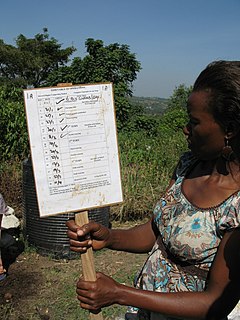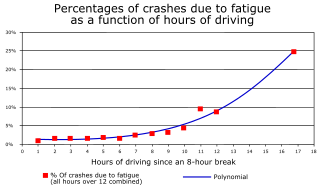Related Research Articles

An aviation accident is defined by the Convention on International Civil Aviation Annex 13 as an occurrence associated with the operation of an aircraft, which takes place from the time any person boards the aircraft with the intention of flight until all such persons have disembarked, and in which a) a person is fatally or seriously injured, b) the aircraft sustains significant damage or structural failure, or c) the aircraft goes missing or becomes completely inaccessible. Annex 13 defines an aviation incident as an occurrence, other than an accident, associated with the operation of an aircraft that affects or could affect the safety of operation.
Medical physics deals with the application of the concepts and methods of physics to the prevention, diagnosis and treatment of human diseases with a specific goal of improving human health and well-being. Since 2008, medical physics has been included as a health profession according to International Standard Classification of Occupation of the International Labour Organization.

A safety-critical system (SCS) or life-critical system is a system whose failure or malfunction may result in one of the following outcomes:
In science and engineering, root cause analysis (RCA) is a method of problem solving used for identifying the root causes of faults or problems. It is widely used in IT operations, telecommunications, industrial process control, accident analysis, medicine, healthcare industry, etc.

Health informatics is the field of science and engineering that aims at developing methods and technologies for the acquisition, processing, and study of patient data, which can come from different sources and modalities, such as electronic health records, diagnostic test results, medical scans. The health domain provides an extremely wide variety of problems that can be tackled using computational techniques.

The Ladbroke Grove rail crash was a rail accident which occurred on 5 October 1999 at Ladbroke Grove in London, England, when two passenger trains collided almost head-on after one of them had passed a signal at danger. With 31 people killed and 417 injured, it remains one of the worst rail accidents in 20th-century British history.

Aviation safety is the study and practice of managing risks in aviation. This includes preventing aviation accidents and incidents through research, educating air travel personnel, passengers and the general public, as well as the design of aircraft and aviation infrastructure. The aviation industry is subject to significant regulation and oversight.

A checklist is a type of job aid used to reduce failure by compensating for potential limits of human memory and attention. It helps to ensure consistency and completeness in carrying out a task. A basic example is the "to do list". A more advanced checklist would be a schedule, which lays out tasks to be done according to time of day or other factors. A primary task in checklist is documentation of the task and auditing against the documentation.
The Aviation Safety Reporting System, or ASRS, is the US Federal Aviation Administration's (FAA) voluntary confidential reporting system that allows pilots and other aviation professionals to confidentially report near misses or close call events in the interest of improving aviation safety. The ASRS collects, analyzes, and responds to voluntarily submitted aviation safety incident reports in order to reduce the likelihood of aviation accidents. The ASRS was designed by NASA. The ASRS is operated by NASA; who is seen as a neutral third-party due to its lack of enforcement authority and relations with airlines. The confidential and independent nature of the ASRS is key to its long-term success in identifying numerous latent system hazards in the National Airspace System (NAS). Under the FAA's authority, NASA extends limited immunity to individual aviation workers for reporting safety events which do not result in an accident, as defined by the FAA. This has the effect of encouraging these potential reporters to come forward with systemic safety issues without fear of reprisal. The success of the system stands as a positive example used as a model by other industries seeking to make improvements in safety. Other industries who have modeled similar systems on the ASRS include the rail, medical, firefighters, and off-shore petroleum production.
Health technology is defined by the World Health Organization as the "application of organized knowledge and skills in the form of devices, medicines, vaccines, procedures, and systems developed to solve a health problem and improve quality of lives". This includes pharmaceuticals, devices, procedures, and organizational systems used in the healthcare industry, as well as computer-supported information systems. In the United States, these technologies involve standardized physical objects, as well as traditional and designed social means and methods to treat or care for patients.
Patient safety is a discipline that emphasizes safety in health care through the prevention, reduction, reporting and analysis of error and other types of unnecessary harm that often lead to adverse patient events. The frequency and magnitude of avoidable adverse events, often known as patient safety incidents, experienced by patients was not well known until the 1990s, when multiple countries reported significant numbers of patients harmed and killed by medical errors. Recognizing that healthcare errors impact 1 in every 10 patients around the world, the World Health Organization (WHO) calls patient safety an endemic concern. Indeed, patient safety has emerged as a distinct healthcare discipline supported by an immature yet developing scientific framework. There is a significant transdisciplinary body of theoretical and research literature that informs the science of patient safety.
A patient safety organization (PSO) is a group, institution, or association that improves medical care by reducing medical errors. Common functions of patient safety organizations are data collection and analysis, reporting, education, funding, and advocacy.
A near miss, near hit or close call is an unplanned event that has the potential to cause, but does not actually result in human injury, environmental or equipment damage, or an interruption to normal operation.
The Rail Safety and Standards Board (RSSB) is a British independent company limited by guarantee. Interested parties include various rail industry organisations, including Network Rail, train operating companies (TOCs), and rolling stock companies (ROSCOs). The RSSB operates as a not-for-profit entity, its primary purpose being to bring about improved health and safety performance throughout Britain's railway network.

Fatigue is a major safety concern in many fields, but especially in transportation, because fatigue can result in disastrous accidents. Fatigue is considered an internal precondition for unsafe acts because it negatively affects the human operator's internal state. Research has generally focused on pilots, truck drivers, and shift workers.

The Confidential Incident Reporting & Analysis Service (CIRAS) is a confidential safety reporting service for health, safety and wellbeing concerns raised by workers in the UK transport industry. It is funded by members and run independently, though is a wholly owned subsidiary of Rail Safety and Standards Board (RSSB). The service covers the following sectors: passenger and freight train operators, light rail, Network Rail and its suppliers, London Underground, and Transport for London (TfL) bus operators.

An accident is an unintended, normally unwanted event that was not directly caused by humans. The term accident implies that nobody should be blamed, but the event may have been caused by unrecognized or unaddressed risks. Most researchers who study unintentional injury avoid using the term accident and focus on factors that increase risk of severe injury and that reduce injury incidence and severity. For example, when a tree falls down during a wind storm, its fall may not have been caused by humans, but the tree's type, size, health, location, or improper maintenance may have contributed to the result. Most car wrecks are not true accidents; however English speakers started using that word in the mid-20th century as a result of media manipulation by the US automobile industry.

Selection, training, cohesion and psychosocial adaptation influence performance and, as such, are relevant factors to consider while preparing for costly, long-duration spaceflight missions in which the performance objectives will be demanding, endurance will be tested and success will be critical.

The Civil Aviation Authority of Fiji (CAAF) is the civil aviation authority in the Republic of Fiji and is responsible for discharging functions on behalf of the Government of Fiji under the States responsibility to the Convention on International Civil Aviation, also known as the Chicago Convention on International Civil Aviation Organization (ICAO). CAAF regulates the activities of airport operators, air traffic control and air navigation service providers, airline operators, pilots and air traffic controllers, aircraft engineers, technicians, airports, airline contracting organisations and international air cargo operators in Fiji.
CIRAS can mean:
References
- ↑ O'Leary, M; Chappell, S. L. (1996). "Confidential incident reporting systems create vital awareness of safety problems". ICAO Journal. 51 (8): 11–3, 27. PMID 11541832.
- ↑ "ASRS: The Case for Confidential Incident Reporting Systems. NASA ASRS Pub. 60" (PDF). NASA. Retrieved 2014-05-15.
- ↑ "ASRS - Aviation Safety Reporting System: International". NASA. Retrieved 19 May 2014.
- ↑ John Davies. "Improved railway safety through the implementation of a confidential incident reporting and analysis system (CIRAS)". University of Strathclyde. Retrieved 19 May 2014.
- ↑ "learning from experience: Post-incident reporting for UK dams -- 2008 Annual Report" (PDF). Environment Agency. March 2009. Retrieved 19 May 2014.
- ↑ Anthony N Nicholson; Peter C Tait. "Confidential reporting: from aviation to clinical medicine" (PDF).Clinical Medicine Vol 2 No 3 May/June 2002, p.234
- ↑ Lewis, A; Taylor, I (2006). "CORESS - a confidential reporting system for surgery". Annals of the Royal College of Surgeons of England. 88 (3): 249–51. doi:10.1308/003588406X106441. PMC 1963668 . PMID 16719990.